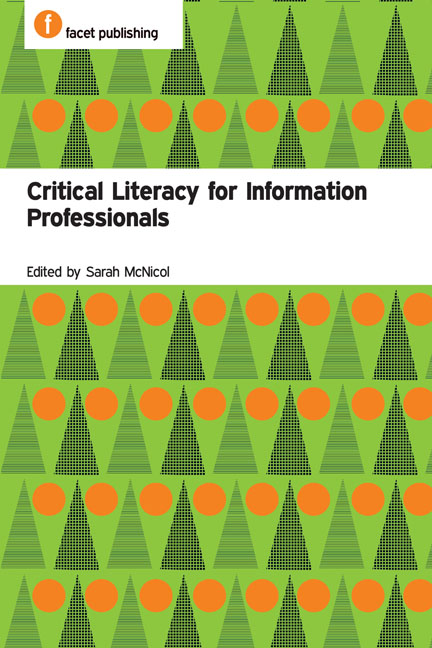Book contents
- Frontmatter
- Contents
- Contributors
- Introduction
- PART 1 THEORIES OF CRITICAL LITERACY
- PART 2 CRITICAL LITERACY IN PRACTICE
- 8 A picture is worth a thousand words: teaching media literacy
- 9 Curricular and extra-curricular opportunities to engage school students in critical literacy in England
- 10 New media and critical literacy in secondary schools
- 11 Critical literacy and academic honesty: a school librarian's role and contribution
- 12 Engaging undergraduate communications students in critical information literacy
- 13 Exploring pedagogical implications of students’ search mediation experiences through the lens of critical information literacy
- 14 Diffusing critical web literacy in a teacher-education setting: initial reflections and future planning
- Further information
- Index
14 - Diffusing critical web literacy in a teacher-education setting: initial reflections and future planning
from PART 2 - CRITICAL LITERACY IN PRACTICE
Published online by Cambridge University Press: 08 June 2018
- Frontmatter
- Contents
- Contributors
- Introduction
- PART 1 THEORIES OF CRITICAL LITERACY
- PART 2 CRITICAL LITERACY IN PRACTICE
- 8 A picture is worth a thousand words: teaching media literacy
- 9 Curricular and extra-curricular opportunities to engage school students in critical literacy in England
- 10 New media and critical literacy in secondary schools
- 11 Critical literacy and academic honesty: a school librarian's role and contribution
- 12 Engaging undergraduate communications students in critical information literacy
- 13 Exploring pedagogical implications of students’ search mediation experiences through the lens of critical information literacy
- 14 Diffusing critical web literacy in a teacher-education setting: initial reflections and future planning
- Further information
- Index
Summary
Introduction
Despite the fact that the web was not designed for use either by children or in educational settings, many governments throughout the world, including Greece (Τζιμογιάννης, 2011), have adopted policies to support its use in educational settings. However, effective online reading demands different capabilities and attitudes as compared to reading printed texts (Coiro and Dobler, 2007). These capabilities and attitudes are often termed ‘web literacy’, ‘an ability to recognize and assess a wide range of rhetorical situations and an attentiveness to the information conveyed in a source's non-textual features’ (Sorapure et al., 1998, 410). Sorapure et al. (1998, 410) argue that ‘teaching such a literacy means supplementing the evaluative criteria traditionally applied to print sources with new strategies for making sense of diverse kinds of texts presented in hypertextual and multimedia formats’. A common distinction is made between three principal subcategories of webliteracy abilities, namely:
• web-searching abilities (e.g. defining appropriate keywords/phrases, knowing alternative ways to locate information)
• web-reading abilities (e.g. navigating meaningfully through hyperlinks, exploiting web pages’ features such as internal searching, indices)
• web-evaluation abilities (e.g. assessing the reliability and authority of online information).
However, web literacy also encompasses intricate higher-order skills and cognitive capabilities required not only to evaluate the content credibility of the accessed information, but also to reveal both the interests that constructed this specific content and the forces that dominate and shape the whole web.
Enhancing web literacy among students requires that teachers themselves become web literate. However, there is a scarcity of web-literacy training for teachers (David, 2009). For example, in Greece a recent study (Bougatzeli et al., 2015) showed that there is a need for web-literacy initiatives to ensure (a) effective pluralism in information provision in educational settings, and (b) the critical evaluation and exploitation of information resources for the benefit of learners.
This chapter describes a multi-level intervention which has been designed and implemented within the undergraduate programme of the Department of Primary Education of the School of Education at the Aristotle University of Thessaloniki, Greece. It outlines the content and implementation of this intervention and then describes student reactions. As the initiative took place in a Greek university, the chapter starts with a brief description of the Greek educational context.
- Type
- Chapter
- Information
- Critical Literacy for Information Professionals , pp. 151 - 160Publisher: FacetPrint publication year: 2016



